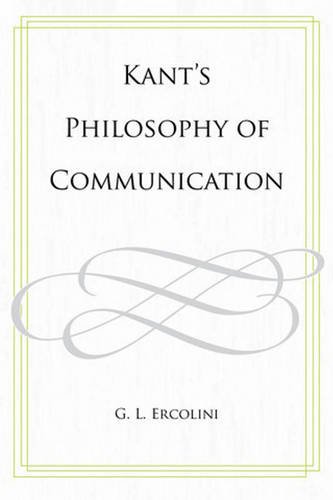All books / Book
Kant's Philosophy of Communication (Philosophy/Communication)

| Full title: | Kant's Philosophy of Communication (Philosophy/Communication) |
|---|---|
| ISBN: | 9780820704869 |
| ISBN 10: | 0820704865 |
| Authors: | Ercolini, G. L. |
| Publisher: | Duquesne |
| Num. pages: | 285 |
| Binding: | Paperback |
| Language: | en |
| Published on: | 2016 |
Read the reviews and/or buy it on Amazon.com
Synopsis
One Might Assume That Another Study Of Immanuel Kant, One Of The Most Prominent Philosophers In The History Of Western Thought, Is Either Presumptuous Or Unnecessary. But In This Highly Original Work, G. L. Ercolini Engages In A New And Inspired Reading Of Kant That Places Communication At Its Center --^ A Move That Many Kantian Scholars Might Have Deemed Impossible. Indeed, Kant Has Typically Been Characterized As The Epitome Of Abstract And Detached Thinking, One Who Dismissed Rhetoric As An Art Of Semantic Delusion. The Need To Communicate Technically Rigorous Ideas To The General Public Was, For Kant, A Persistent And Pressing Concern, And Points To The Way In Which His Treatment Of Rhetoric Has Been Understood. As We See Here, Kant Maintained That Rhetoric's Use To Delude And Deceive Was A Misuse Of Genuine Rhetoric; Thus, His Ostensible Rejection Of Rhetoric More Generally Must Be Examined Within The Broader Terrain Of Communicative Practices That He Considered Important To His Own Enlightenment Thought. As Ercolini Demonstrates, Kant Was Actually Quite Invested In The Social Realm Of Human Interaction, As Evinced In Both His Life And Writings.^ Whether At The Table Enjoying A Shared Meal And Conversation, Or Formulating Aesthetic Judgments, Or Participating In Popular Debates, Kant Can Always Be Seen To Be Already Attuned To The Human Communicative Enterprise. The Prevailing Scholarly Emphasis On Kant's First Two Critiques Has, In Fact, Obscured This Interest, Whereas Ercolini's Study Ranges Across The Entirety Of Kant's Canon, Including His Anthropology From A Pragmatic Point Of Viewand The Third Critique, Critique Of Judgment, To Identify An Entwined Anthropological Ethics, Rhetoric, And Aesthetics That Form The Basis Of Kant's Philosophy Of Communication.^ In A Brief Essay, Kant Asks, What Is Enlightenment? By Examining Kant's Own Thought From A Fresh Perspective And Framework, It Becomes Clear That Enlightenment Requires A Broader And More Vibrant Notion Of Reason, In Which Reason Extends Across The Public Realm Of Discourse And Action As It Undergirds Communication, Revealing A Rhetorical Sensibility That Operates As A Basis For Both Aesthetics And Politics -- From The Publisher. Enlightenment And The Philosophy Of Communication -- Immanuel Kant And The Question Of Rhetoric -- On Popularity: Kant's Rhetorical Attunement -- Ethics From The Other Side: Kant's Embodied Anthropological Ethics -- Aesthetics, Communication, And The Discordant Accord Of The Faculties -- Style And Tonality In Kant's Philosophy Of Communication -- Kant's Enlightenment Legacy: Critique, Popularity, Publicity. G.l. Ercolini. Includes Bibliographical References (pages 235-242) And Index.